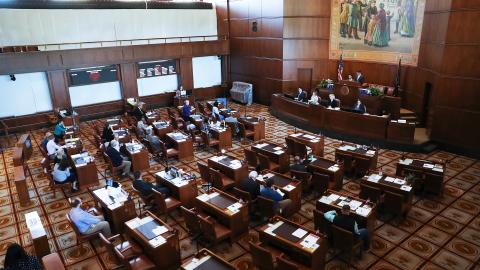
State Supreme Court Blocks 10 Republicans from Running for Reelection After Pro-Life Protest
The high court ruled in favor of the secretary of state's decision to disqualify the senators from the ballot under a voter-approved measure aimed at stopping such boycotts. Measure 113, passed by voters in 2022, amended the state constitution to bar lawmakers from reelection if they have more than 10 unexcused absences.
The 10 state senators' quorum-denying 2023 walkout lasted six weeks, the longest in state history, paralyzing the legislative session
Five state lawmakers sued over the secretary of state's decision — Sens. Tim Knopp, Daniel Bonham, Suzanne Weber, Dennis Linthicum, and Lynn Findley. They were among the 10 GOP senators who had more than 10 absences.
Reacting to the ruling, the Oregon Senate Republican Caucus said in a statement: "The Oregon Supreme Court has officially sided with Democrats on Measure 113, effectively ending the service of 10 Republican senators – one-third of the Oregon Senate."
The Oregon State Senate has 30 seats.
"We obviously disagree with the Supreme Court's ruling," said Knopp, the Senate minority leader. "But more importantly, we are deeply disturbed by the chilling impact this decision will have to crush dissent."
Democratic Senate President Rob Wagner praised the ruling.
"Today's ruling by the Oregon Supreme Court means that legislators and the public now know how Measure 113 will be applied, and that is good for our state," he said in a statement.
***Please sign up for CBN Newsletters and download the CBN News app to ensure you keep receiving the latest news.***
 During arguments before the high court in December, attorneys for both the senators and the state grappled over the grammar and syntax of the language that was added to the state constitution after Measure 113 was approved by voters.
During arguments before the high court in December, attorneys for both the senators and the state grappled over the grammar and syntax of the language that was added to the state constitution after Measure 113 was approved by voters.
The amendment says a lawmaker is not allowed to run "for the term following the election after the member's current term is completed."
The two sides debated just when that ineligibility kicks in. If a senator's term ends in January 2025, they would typically seek reelection in November 2024. The "election after the member's current term is completed" would not be until November 2028, the Republican senators argued, so they could run for reelection this year and then hold office for another term before becoming ineligible.
The court disagreed, saying that while the language of the amendment was ambiguous, the ballot title and explanatory statement made clear the intent was to bar truant lawmakers from holding office in the next term.
Sen. Daniel Bonham (R-The Dalles) objected to the court's reasoning.
"Every legal mind I've heard from regardless of political leanings has affirmed that when there is only one interpretation for the plain language of the law, that is final. The language incorporated into the Oregon Constitution was clear and yet the Supreme Court ruled that voter intent, which cannot be determined by any metric, supersedes the Constitution. There is no justice in a political court," Bonham said in a statement.
In a post to the social media platform X, the Oregon Republican Party asked: "'So we clip the voters pamphlet to the Constitution to know what it means?'"
The post included a sentence from the high court's ruling: "If we were required to choose between petitioners' and the secretary's interpretations based on the text alone, petitioners would have a strong argument that their reading is the better one." - ORSC ruling
So we clip the voters pamphlet to the Constitution to know what it means?
— Oregon GOP (@Oregon_GOP) February 1, 2024
"If we were required to choose between petitioners' and the secretary's interpretations based on the text alone, petitioners would have a strong argument that their reading is the better one." ORSC ruling pic.twitter.com/eqv4tMjoRD
Oregon voters overwhelmingly approved Measure 113 in 2022 after the legislative walkouts happened three years in a row.
Separate Federal Lawsuit and the Future of Walkouts
Knopp said he didn't plan to appeal the decision or join a separate federal lawsuit filed by three GOP senators challenging their disqualification from the ballot. A federal judge in December ruled against the three lawmakers, and they have appealed the decision to the 9th U.S. Circuit Court of Appeals.
He conceded that the "significant turnover" of Republican senators would be challenging but said he wasn't concerned. He said in the future it's still up to individual lawmakers to let their principles guide their actions.
"I think legislators need to stand on the principles that they believe in, and if you believe in it enough to make the sacrifice, then you most certainly should," he told reporters.
And the high court's ruling might not impede lawmakers' walkouts as some may expect.
Bryan Iverson, legislative director for the Oregon Senate Republicans, told OregonLive.com that some lawmakers might be willing to forgo reelection to kill Democratic bills they fervently oppose, and participating in a walkout could help boost the public image of lawmakers preparing to run for higher office.
The ruling has no immediate impact in terms of the lawmakers seated for the upcoming 2024 legislative session because all 10 of the senators who walked out for at least 10 days last year are serving terms that run through either the end of 2024 or the end of 2026, according to KGW-TV.



